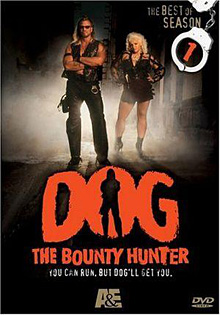 |
 |
 |
 Editorials | Issues | April 2007 Editorials | Issues | April 2007  
Dog's Day
 Nick Lewis - Calgary Herald Nick Lewis - Calgary Herald


| | Reality TV's bounty hunter brings tales of reform and legal woes |
Every dog has his day, and if justice is met, Dog the Bounty Hunter will soon have his.

There is still hope that Duane (Dog) Chapman, a 53-year-old American bounty hunter made famous by a reality show on A&E, will not have to face extradition charges to Mexico in the infamous Andrew Luster case.

"An appellant court in Mexico has finally heard our story," a soft-spoken Chapman says from New York en route to Canada for a speaking tour that brings him to NAIT tonight. "And they are deciding whether to drop it in their home country. So we're hoping it will be dropped, just like that. And if it isn't, then we still have a shot at the American courts."

"Truth and justice will prevail, it will just take time for the wheels of justice to move."

For a reality TV star, even one as accustomed to drama as Chapman, this is some harsh reality. Since the debut of his series in 2004, he's become a kind of cult hero thanks to his gruff exterior and obvious love for his family. The series follows his bounty hunting crew, including wife Beth Smith, as they track down fugitives from the law to collect bonds.

Despite his TV fame, it's his legal woes in Mexico that have grabbed the most attention. The charges stem from Chapman's June 2003 capture in Puerto Vallarta of Luster, a convicted rapist and heir to the Max Factor fortune, after a 166-day international manhunt.

Mexican authorities charged Chapman and two associates, his son Leland and Tim Chapman (no relation), with "deprivation of liberty" in a country where bounty hunting is illegal. They posted bail and left Mexico, but in September 2006, they were arrested in Honolulu on the request of Mexican authorities and held overnight before posting bail again. If convicted, they could serve up to four years in jail.

Meanwhile, Luster was sentenced to a 124-year-prison term in California, and Chapman has yet to claim the bond money for his capture.

Still, Chapman says the arrest was the right thing to do.

"Andrew Luster was convicted of 86 counts of rape, and in my business, when that happens, that's like being a fireman and the house across the street is on fire."

"It was right up our alley. And that kind of horrendous thing, someone has to do it, and we know we're that someone."

"We hunted him for 166 days, and after the first five days it became very personal. Once we got into the horrendous things he did, what the victims told us was sickening, and we knew we had to capture this guy. Because every night he was free was another night he could be doing more of it. During those 166 days he was free, there could have been another 100 victims."

There's something likable about Chapman in his soft manner of speaking, his politeness and his rags-to-riches story. As a young man, he was a member of a biker gang and was arrested dozens of times. He spent time in prison for a murder conviction -- for which he maintains his innocence -- before beginning his life as a bounty hunter and family man. It's that story of reformation that is behind much of his appeal.

Even now, he refuses to give up on Luster's chances for reform. While the bounty hunter is proud of having a high conversion rate of his more than 7,000 captured fugitives -- 40 per cent of them turn their lives around and get jobs, he says -- he'd rather not comment on whether there's any hope for Luster.

"Brother, I don't know," he says, sighing. "I've never chased anyone like that in my life. I hope there's hope for him, because he will end up dying in jail. And I don't know how I feel about that."

Chapman is legally allowed to leave the U.S. and enter Canada for two speaking engagements, one in Edmonton, the other in Calgary. He says those occasions are an attempt to set the record straight on his legal woes and talk about his own inspiring life story.

Fifty per cent of visitors to his Honolulu-based business, Da Kine Bail Bonds, are Canadian, he says. Some have contributed to a legal fund, should Chapman have to take his case to court, and others have signed a petition on his official site asking the Mexican government to desist in its extradition attempts.

In the meantime, Chapman is holding off on the release of his autobiography, entitled You Can Run But You Can't Hide, until August. The book will cover his childhood, his early run-ins with the law as a member of a biker gang, all the way up to the Luster case.

Chapman says he hopes he can inspire felons to turn their lives around.

"I've always had this good seed inside me and I don't think the bad one ever grew," he says.

"I saw that incarceration and that way of life was not for me. There was no bucket of gold at the end of the criminal rainbow, there was only life in an eight-by-six-foot cell. And I was smart enough to see the signs and turn the other way." | 
 | |
 |



